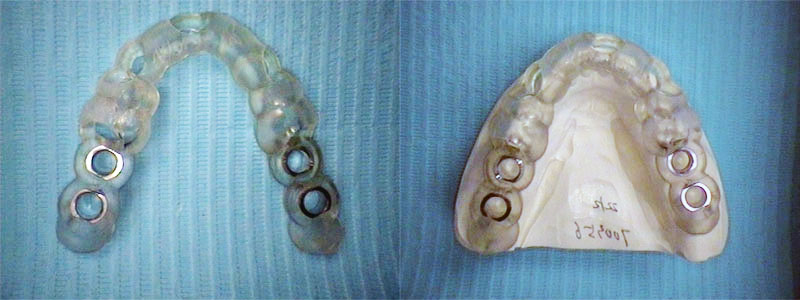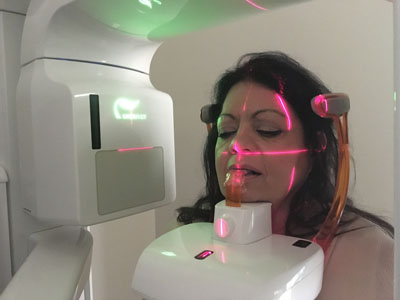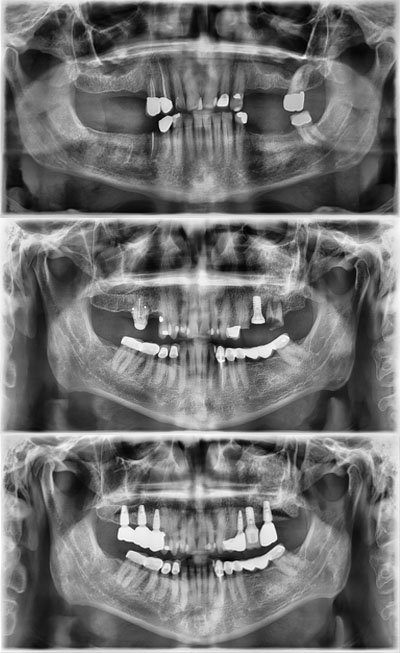Dental implants have become the gold standard in restorative dentistry for patients who have lost teeth. After a patient loses a tooth or teeth, implants are often placed in the mouth to provide a strong foundation for false teeth that look exactly like the patient’s natural teeth. The use of titanium posts that are inserted through the gums into the jaw bone has revolutionized tooth replacement. Recently, a new and sophisticated surgical technique known as 3D guided dental implant surgery has increased the accuracy with which the titanium posts can be placed in the mouth.
Using 3D dental imaging and state-of-the-art technologies to gather extremely detailed information about the patient’s mouth, face, and other structures, dentists are able to pre-plan the implant surgery, creating a virtual model of the patient’s face. As a result, issues can be resolved in advance of the surgery and the optimal positioning of the titanium posts is optimized. The final result of surgery is even better than what’s possible using traditional surgical techniques for implants.
There are a number of important advantages and benefits to having 3D guided surgery done to ensure proper placement of dental implants.

 Improved Accuracy - The level of precision that’s possible using 3D guided imagery tools is unprecedented. This higher-level precision means that the exact position of tissues like nerves, bones, nearby tooth roots, the sinus cavities, and blood vessels can be avoided to reduce the risk of adverse effects following surgery. Further, increased accuracy means that the results of surgery are more predictable. Success rates are higher and the aesthetic outcomes tend to be more pleasing. Patients with complex cases (such as where the quality or quantity of bone tissue poses an obstacle to success) are likely to see much better results from surgery performed with these high-tech tools.
Improved Accuracy - The level of precision that’s possible using 3D guided imagery tools is unprecedented. This higher-level precision means that the exact position of tissues like nerves, bones, nearby tooth roots, the sinus cavities, and blood vessels can be avoided to reduce the risk of adverse effects following surgery. Further, increased accuracy means that the results of surgery are more predictable. Success rates are higher and the aesthetic outcomes tend to be more pleasing. Patients with complex cases (such as where the quality or quantity of bone tissue poses an obstacle to success) are likely to see much better results from surgery performed with these high-tech tools. With Sterling Dental you will be met with a team that will help you restore you smile after you have lost one or more teeth. Call and schedule your appointment to meet with our caring and professional dentist.
 Dental implants are small titanium cylinders that are inserted into the jaw, mimicking the root structure of the natural tooth.
Dental implants are small titanium cylinders that are inserted into the jaw, mimicking the root structure of the natural tooth.
A crown is then anchored to the implant that looks, feels & functions like a natural tooth.
Unlike other tooth-replacement options, implants recreate the structure of a natural tooth, can stop bone loss, do not affect adjacent healthy teeth & restore your biting & chewing power.
Dental implants can last a lifetime & will look & feel like your own teeth. Unlike a bridge, which requires that surrounding teeth be ground down, the implant will not affect any other teeth or deteriorate the jawbone. Over time, your gums & jawbone will integrate with the implant, creating a more natural look than with bridges, which can cause gums to recede. Implants are also a secure, comfortable & hassle-free alternative to traditional dentures. Whether you need a single implant or an entire mouthful, the result is both cosmetic & practical, allowing you to eat your favorite foods & smile with confidence again.
If you’re interested in dental implants to replace your missing teeth, the first step is scheduling a consultation visit with our doctors. There are health conditions & risk factors to take into account, so not everyone is an ideal candidate for dental implants. During your consultation, the doctor will review your oral health & clearly explain your best option for restoring your smile.
Because implanted teeth are fixed in the mouth—rather than being removable, like dentures—they allow a return to the comfort & function of natural teeth. Increased chewing ability means you can enjoy more nutritious foods, contributing to your overall health & wellbeing. Dental implants can help prevent future dental problems, especially the gradual bone loss in the jaw associated with missing teeth.
In addition to being beneficial to your nutrition, no longer being restricted from eating certain foods will certainly improve your mood! You’ll be able to enjoy all the same foods that those with natural teeth enjoy.
Of course, you may be even more excited about your beautiful smile. If you’ve had missing teeth or poor-fitting dentures, chances are you haven’t been confident in your smile for a while. You may have even been hiding it behind your hand or avoiding smiling completely. Many patients who have gotten dental implants report a spike in confidence & the urge to smile a lot, just because they can!
Many implant patients also experience an improvement in facial aesthetics. Your new implants mean your jaws will align properly, giving your face a more balanced & often more youthful appearance.
Depending on your health condition & the type & number of implants you need, the implant procedure can take a day or a total of a few months.
In most cases when only one or a few implants are being placed, the first phase of treatment involves placing the implant in the bone of the jaw & allowing the bone to heal around it. The procedure itself takes 1-2 hours & the healing time can be 3-6 months. Once the dentist is satisfied that the implant is securely healed in place, the crown (i.e. the artificial tooth) will be attached to the implant. This takes one or two visits, depending on the situation.
For patients who are replacing all of their teeth at once, getting implants & prosthetic teeth placed in a single day is possible, though the overall healing time is usually about the same (3 months).
When properly taken care of just like natural teeth, dental implants should last a lifetime. In order to make sure your implants last, it’s important to follow all of the post-procedure instructions from your dentist. If you experience any pain or discomfort for an unusually long time after your procedure, please contact us right away.
Not all patients are eligible for dental implants. Generally, you must be in good general & oral health to be a candidate for implants. Those who are undergoing cancer treatment, have uncontrolled diabetes or uncontrolled periodontal (gum) disease, may not be eligible for dental implants. These conditions can affect whether the dental implant can be properly secured into the bone of your jaw, & can also affect post-operative outcomes. In creating your dental implant treatment plan, the dentist will assess all of the relevant health factors & advise you accordingly.
The main way implants are better than bridges for replacing missing teeth is they don’t rely on attaching to surrounding healthy teeth in order to stay in place. Because bridges are attached to surrounding teeth, they require these healthy teeth to be reshaped in order to replace the missing tooth between them. Bridges can also put you at a higher risk of tooth decay in the supporting teeth, while a standalone implant does not.
The biggest advantage implants have over dentures is that they’re permanent. Unlike removable dentures or partial dentures, implants do not involve messy adhesives or false teeth getting in the way of speech or eating. Also, because they’re permanent, implants will always be a perfect fit, unlike dentures which may need to be refitted or replaced over time.
With dental implants from Sterling Dental in Libby, all these things are possible!
Copyright © Sterling Dental PC